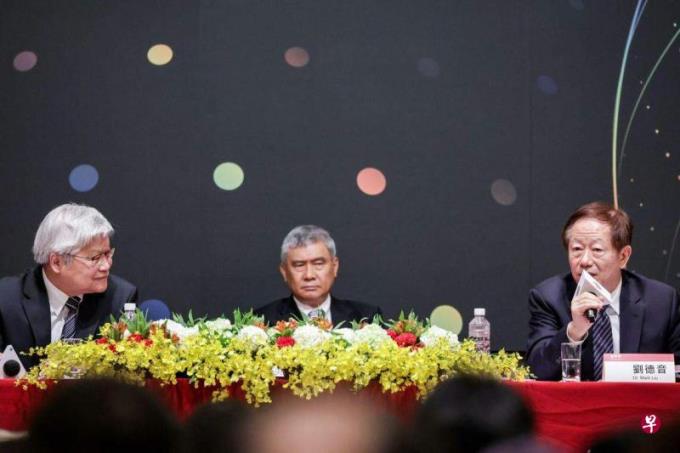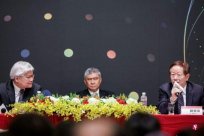
Liu Deyin, chairman of the Taiwan Style Circuit Manufacturing Company (TSMC), said at a shareholders' meeting on Tuesday (June 6) that Taiwan's semiconductor industry can help stabilize geopolitical tension.President Wei Zhe's family released the Back signal of the Valley bottom. It is expected to have a slight negative growth throughout the year. The performance in the second half of the year has improved, and the strong growth will be resumed next year.
As a leading company in the world, TSMC provides core computing processors for smartphones, computers and artificial intelligence for smartphones, computers and artificial intelligence for more than 90 % of nanometer process.One nanometer (NM) is one millionth of millimeters (mm). Three nano -chip -sized three -nanometer chips can accommodate more than 20 billion transistors, and improve the operation speed and save more power.
However, in the past year, the geopolitical concerns caused by the situation in the Taiwan Strait and the extensive Sino -US scientific and technological warfare have allowed TSMC to face the pressure of overseas production to diversify risks.After the epidemic was soothing, the global pressure of inflation and economic discharge was caused, which led to the oversupply and inventory accumulation of the information industry, causing the semiconductor outlook and the stock price to fall into a low tide.
Therefore, since the high -profile announcement of the three -nanometer process chip in December last year, after mass production and expansion in Taiwan, and the red fire of artificial intelligence (AI) chip pushing TSMC's stock price, how TSMC cope with geopolitics and outlook market outlook has become the year.The focus of the shareholders' meeting.
Liu Deyin said in his speech that he believes that Taiwan's semiconductor industry has a stable and geopolitical tension. Neither the United States and mainland China cannot have TSMC; if Taiwan's semiconductor industry does better, China and the United States will have more considerations.
He added that he was interviewed after the meeting that Taiwan semiconductor was not the cause of geopolitics. Geopolitics was far greater than semiconductors. It was a problem that was not related to each other at different levels. It was not an affected by a company or country.
Liu Deyin also shouted to shareholders' confidence.He said that under the trend of geopolitical and complex, TSMC has continued to improve in terms of technological leadership, excellent manufacturing and customer trust.In the past few years, challenges have experienced the challenges of Sino -US trade conflict, crown disease epidemic, Russian and Ukraine War and climate change. They still continue to develop rapidly on the stable road. "I see our prospects very bright."
TSMC's revenue has grown for 13 consecutive years, including last year's revenue increased by 33.5%compared to the previous year, but this year's first decline in 14 years.However, Liu Deyin pointed out that TSMC's customer inventory has gradually decreased, indicating that market terminal demand has rebounded.
President Wei Zhejia reported that TSMC's revenue in the first half of the year is expected to decrease by 10%year -on -year. The performance in the second half of the year is better than the first half of the year.increase.
TSMC is a chip supplier of Nvidia (Nvidia, Taiwan called Huida).Liu Deyin revealed that the sales volume of high -efficiency energy computing (HPC) chip in 2022 exceeded the first surpassing smartphones. The rise of the generation AI will consolidate this trend. To this end, TSMC prepares to double the capacity of advanced chip packaging.
In order to establish mutual trust with customers and attract more talents, TSMC is expanding production capacity in the United States, mainland China and Japan, and is evaluating to set up factories in Germany.
However, Wei Zhe's family said that the capacity of overseas construction accounts for less than 10%of the total capital investment.He also believes that most of the current three -nanometer and the advanced process of two -nanometer and 1.4 nanometers will stay in Taiwan.
Dr. Wu Lingxiang, a consultant to the technology industry, pointed out in an interview with the United Morning Post that TSMC responded steadily in geopolitical challenges in the past few years, allowing people to continue to cut thorns in the face of uncertainty in the face of future uncertainty.
But he reminded that the Russian and Ukraine War, the war of the Sino -US conflict agent, has not yet ended. The Sino -US scientific and technological warfare, which is mainly on the semiconductor industry, is still ongoing, and the situation of TSMC is still difficult.
Wu Lingxiang said that the new orders brought by the AI boom brought unexpected surprises and kinetic energy to TSMC, but artificial intelligence has not yet established a mature solution and profit model.
"For TSMC, the worst time may have passed, and now it is about the bottom of the valley; but if it is about to rebound immediately, it may be slightly optimistic, should you observe it?"


